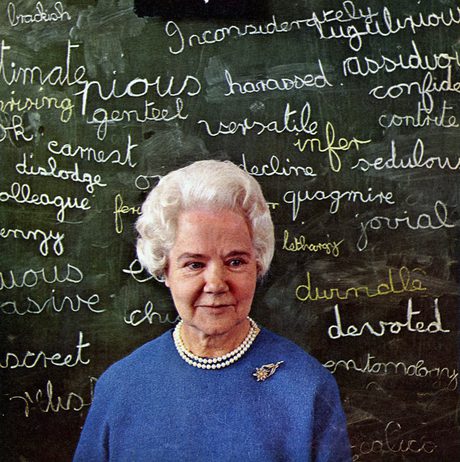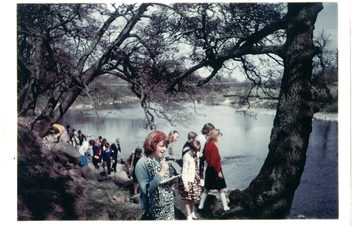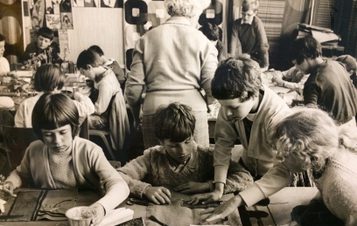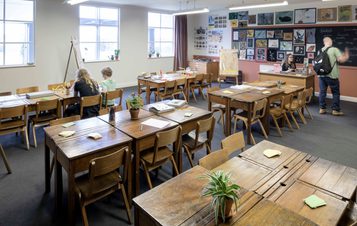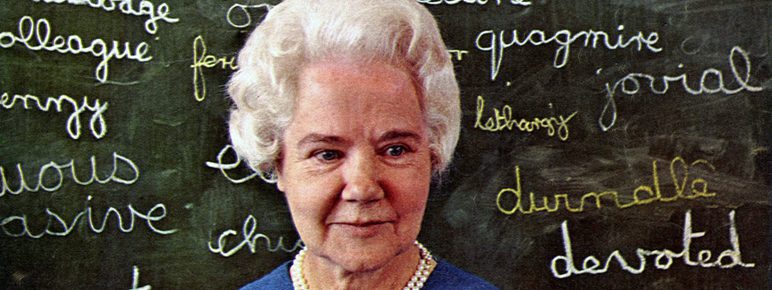
About Ruth Ewan & Oscar Murillo
YSP brought together two projects by artists Ruth Ewan and Oscar Murillo that explored the continued vital role of a creative approach to child development.
The newly commissioned work by Ewan referenced the philosophy of two of the most influential educators of the 20th century, Sir Alec Clegg and Sir Herbert Read, while Frequencies, an ever-evolving global project created by Murillo, in collaboration with students around the world, gave insight into what it’s like to grow up in different countries in the 21st century.
In Longside Gallery, Ewan’s participatory installation, Asking Out, recreated a Castleford primary school classroom from 1972. Inspired by the holdings of the National Arts Education Archive (NAEA) based at YSP, visitors were introduced to the pioneering teaching method ‘Asking Out’, a technique – developed by untrained Castleford teacher Muriel Pyrah, which invited children to speak out, ask questions and directly engage with each other.
The experimental methodology, which drew national media interest in the late 1960s and early 1970s, encouraged self-directed learning, fed into future teacher training under the leadership of Alec Clegg, and is still relevant today in what we might now call peer-to-peer learning. Clegg and Read believed that if you teach a child creatively they will become a fully rounded person and contribute to society as a whole, an ethos shared by YSP with its roots in Bretton Hall College and evidenced through the collection of the NAEA.
Developed from research carried out with Pyrah’s former pupils and colleagues, Ewan’s project explored the teacher’s unconventional methods and continued Ewan’s investigation into alternative education models and overlooked histories. Reconstructed as faithfully as possible, the classroom walls showcased children’s paintings, drawings and embroidery drawn from the NAEA collection. Activating the artwork and bringing the space to life, Ewan invited people to contribute to the space and to participate in creative activities echoing those taught by Pyrah, including studying nature through creativity. Ewan created a situation for people to think about creative education, its impact upon social mobility, and how this can be mobilised today at a time when creative forms of learning have been marginalised from the curriculum.
Murillo’s ongoing project sought to record the ‘frequency’ of different childhoods across the world. It had already taken place in more than 31 countries and was represented in this exhibition through a display of over 80 canvases. Working with his parents and political scientist Clara Dublanc, Murillo and his team fixed blank canvases to school desks for six months and, without materials or instruction, pupils were invited to mark them in any way they choose – there were no rules. Some of the canvases featured were made by children from two schools in nearby Castleford – the birthplace of Henry Moore.
The project began in 2013 in Murillo’s hometown of La Paila in Colombia and, to the date of the exhibition, had a growing archive of over 15,000 individual canvases. The YSP selection illustrated the students’ thoughts, expressions, and chance interventions, creating a ‘map’ of children’s experiences across the globe. Murillo's interest was not only in documenting the cultural and social differences that occur worldwide, made visible in the different ways that children approach the canvases, but also the similarities.
Providing exceptional art for everyone has been YSP’s goal since opening to the public in 1977. Its pioneering learning programme reaches 45,000 people every year, enabling access, understanding and enjoyment of art for a wide range of audiences, particularly those traditionally excluded from the arts due to social, economic, cultural or health inequalities. Prompting discussion around the importance of arts and cultural learning in schools, museums and galleries, this project continues a strand of YSP’s programming that has included Art, Games and Play (2018); Treasures Revealed (2017); and Bob and Roberta Smith: Art for All (2015).
You might also like
- Art Outdoors
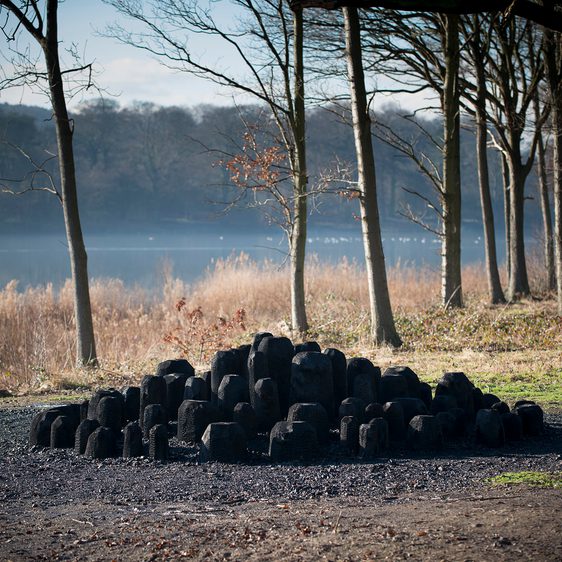
David Nash: Black Mound
Black Mound was made for the YSP landscape by David Nash in 2013. Once in place, he charred the oak forms through a carefully controlled burning process that relates to his interest in the four elements. - Art Outdoors
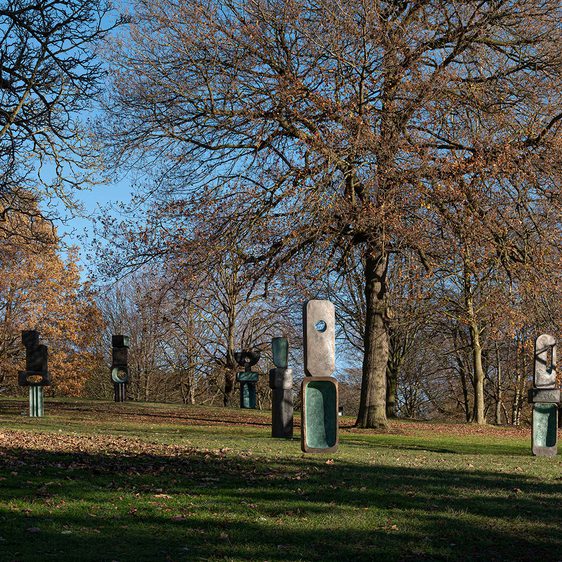
Barbara Hepworth: The Family of Man
- News
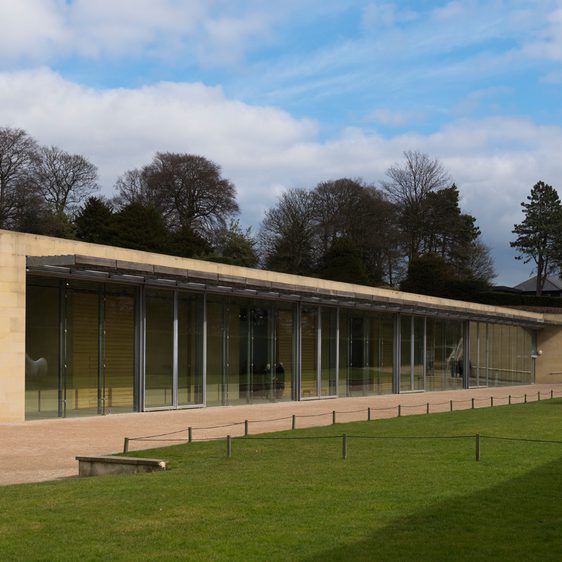
YSP Chair of Trustees, Peter Clegg, awarded an OBE for ‘Services to Architecture’ in King Charles’ New Year Honours List.
8 January 2025 - Art Outdoors
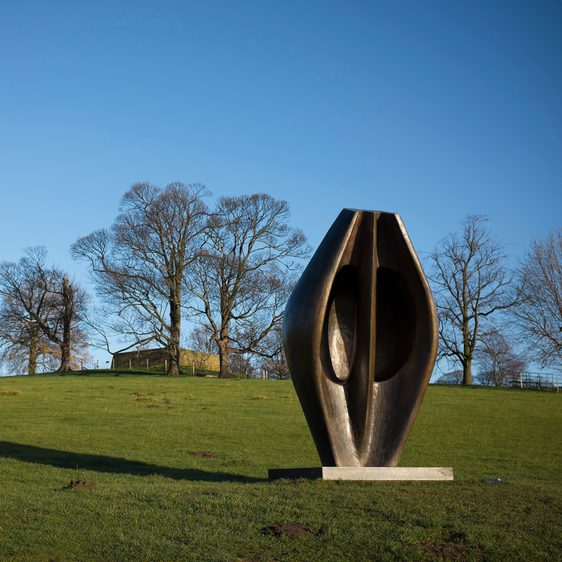
Henry Moore: Large Totem Head
This sculpture is enlarged from a much smaller work made five years previously called Head: Boat Form and the resemblance to a hollowed-out boat remains clear. However, unlike that sculpture, which sat horizontally, Large Totem Head is raised to a standing form, assuming the totem-like presence of its title.
